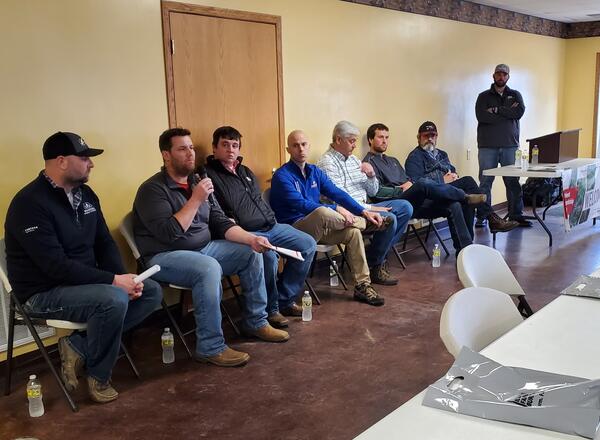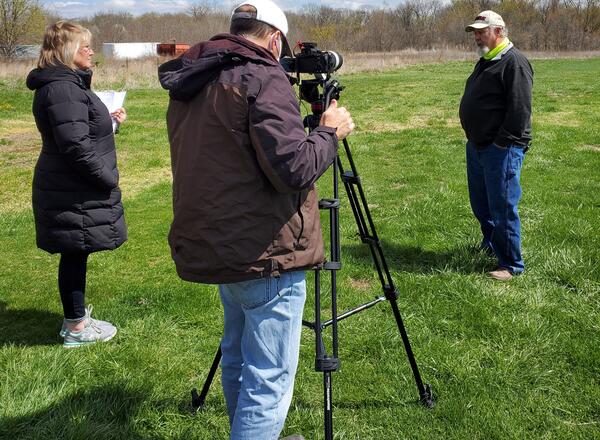 (10).png?itok=nRuOAj0l)
The Illinois Farm Bureau (IFB) Nutrient Stewardship Grant (NSG) Program was developed in 2015 to support the Illinois Nutrient Loss Reduction Strategy and is the topic of the NLRS Podcast Episode 51. The NSG is now a cornerstone of IFB for its efforts and initiatives on nutrient loss reduction.
About the NSG
In 2023, 23 different County Farm Bureaus (CFB) are working on 17 NSG projects across the state. NSG projects typically fall into one of four priority areas:
-
Provide education and outreach to farmers, landowners, and the public
-
Supporting research of BMPs to reduce nutrient losses
-
Supporting farmer implementation of BMPs
-
Demonstrating progress toward the long-term goals of the NLRS
The areas help prioritize all IFB projects, including those in the NSG program. The 2023 grant program has seen a lot of creative uses of these funds to support some of the bigger projects such as matching funds required for Illinois Section 319 and RCPP grants. Furthermore, grant funds are being used to support research and demonstration projects taking place on member farmers’ fields, hosting watershed planning meetings, developing and distributing fact sheets, and hosting field days. You can explore their site to learn more here.
County efforts
NSG has been used to support watershed planning and implementation efforts across the state, but especially within the N-priority (Lower Rock River and Mississippi North Central) and P-priority (Little Wabash and Embarras) watersheds outlined in the NLRS. The CFB managers featured in the latest episode of the podcast are representatives of counties within these priority watersheds.
Knox County
Knox County falls within the Mississippi North Central Watershed and has used the NSG program to fund ongoing projects that support the NLRS. One of the projects works with the Young Farmers Group, which consists of farmers ages 18 – 35, focuses on cover crops. The project started in 2019 and has farmers in 18 of the 20 townships planting a 20-acre plot of cover crops. The cover crop mix is determined by the issue or goal of the field. In collaboration with West Central FS, cover crop seed is subsidized. Soil samples have been taken from each of the fields and are being analyzed by Dr. Giovani Preza-Fontes, University of Illinois Extension Agronomist, to create sharable information regarding this project.
Knox County also plays a supporting role in the creation of the Mississippi North Central Watershed Characterization. Knox CFB has hosted watershed planning meetings in 2021 and 2022, with funding from the IFB Nutrient Stewardship Grant program, which allowed area landowners opportunities to discuss their concerns and project interests in the watershed. In
As the current projects mature, the Knox CFB is looking forward to continuing to provide education and outreach opportunities from the cover crop project, as well as sharing watershed planning updates to their members and other area farmers.

Lawrence & Richland Counties
Lawrence and Richland counties are both located within the Embarras River Watershed (ERW). Richland and Lawrence CFBs are long-time supporters of watershed improvement projects in the ERW. Alongside IFB and several other CFBs, they committed in-kind match for education and outreach as part of a 2019 IEPA 319 grant application to update the 2011 ERW Management Plan and write watershed plans for the Slough and Polecat Creek sub-watersheds.
In 2021, the counties partnered together to host a cover crop field day near the Embarras River which consisted of topical experts and a farmer panel to provide information to producers on soil health. This field day is one component of their ongoing support of ERW efforts and the CFBs look forward to continuing to engage in watershed initiatives as they arise. Read more about this field day on FarmWeekNow.

Future goals
These county efforts discussed by Hailey, Kenzie, and Kacie are all prime examples of how the Illinois Farm Bureau uses the NSG program to support things like Section 319 grants as well as local projects that support the NLRS. Looking forward, a top goal of the program is to support locally led projects and develop local partnerships to address questions raised by CFBs and members about what can be done regarding nutrient stewardship and provide local information and resources. Ultimately, the program is designed to continue to support members as they answer their own questions about nutrient loss and develop programs and practices that answer those questions.
What can farmers do?
If a farmer member has an idea related to a potential project, they can start by simply having a conversation with someone at IFB, whether that is a CFB manager or the county Farm Bureau board. Once they have had those conversations, the next step is to consider how to begin collaboration among local partners. Then projects can be brought up to IFB at any point throughout the year to start planning for a successful grant application and project.
To explore upcoming field days, check out this link.
ABOUT THE AUTHORS
Rachel Curry is a Watershed Outreach Associate for two Nitrogen Priority Watersheds (Flint-Henderson and Lower Rock River Watersheds) and is housed in the Galva office of the Henry, Mercer, Rock Island, and Stark Counties Extension Unit. Rachel earned a BS in Environmental Studies from Knox College and an MS in Environmental Science and Soil Science from Iowa State University with an emphasis on soil fertility. She is interested in sharing information on the Illinois Nutrient Loss Reduction Strategy and agricultural conservation practices through discussion and outreach.
Nicole Haverback is a Watershed Outreach Associate for two Phosphorus Priority Watersheds (Embarras and Little Wabash River Watersheds) and is housed in the Effingham office of the Clay, Effingham, Fayette, and Jasper Counties Extension Unit. Nicole earned a BS in Agriculture and Rural Policy Studies from Iowa State University in May of 2022. She is interested in sharing information on the Illinois Nutrient Loss Reduction Strategy and agriculture conservation practices through discussion and outreach.
ABOUT THE BLOG
At Illinois Extension, we’re working to improve water quality at home and downstream. Every month, our watershed outreach associates will bring you stories highlighting agricultural conservation practices, current research projects and results, and from the field farmer interviews. The Nutrient Loss Reduction blog covers conservation practices recommended by the Illinois Nutrient Loss Reduction Strategy, timely updates, farm safety, and new decision tools to help farmers and producers reduce the nutrients leaving their field. Want to get notified when new blog posts are available? Subscribe at go.illinois.edu/SubscribeINLRS.